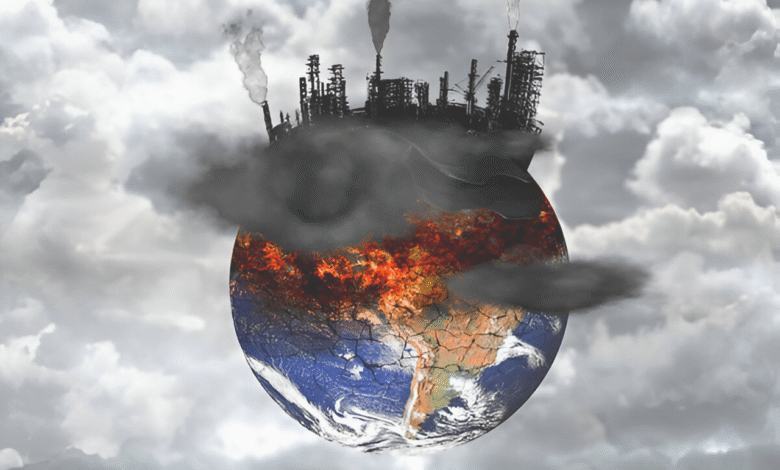What If the Earth Stopped Spinning? (A Bizarre Thought Experiment)
Earth stopped spinning? Explore catastrophic consequences. extreme weather and why rotation is vital for life in this mind-blowing

The Earth’s rotation is so fundamental to our existence that we rarely stop to consider what would happen if it suddenly ceased. This bizarre thought experiment reveals just how crucial our planet’s spin is to maintaining life as we know it. From the 24-hour day-night cycle to weather patterns and ocean currents, Earth Stopped shapes nearly every aspect of our environment. If motion were to Earth Stopped, the consequences would be nothing short of apocalyptic triggering unimaginable winds, reshaping continents, and potentially rendering the planet uninhabitable.
While the scenario of Earth Stopped its spin is purely hypothetical, examining it helps us appreciate the delicate balance of forces that sustain our world. Scientists use such extreme thought experiments to better understand planetary physics and the conditions necessary for life. As we explore this chilling possibility, we’ll uncover how Earth’s rotation influences gravity, climate, and even our protective magnetic field and why losing it would mean the end of life as we’ve evolved to know it.
What If the Earth Stopped Spinning? (A Bizarre Thought Experiment)
The Immediate Effects of Earth Stopped
If the Earth Stopped spinning abruptly, the immediate consequences would be devastating. The planet rotates at about 1,670 km/h (1,037 mph) at the equator. If this motion ceased, everything not anchored to the ground would continue moving at that speed due to inertia. Buildings, trees, and even the oceans would be flung eastward, causing unimaginable destruction. The atmosphere would also keep moving, generating winds faster than any hurricane. These supersonic winds would scour the surface, eroding landscapes and making it nearly impossible for life to survive. The sudden Earth Stopped would trigger mega-tsunamis, as the water in the oceans would rush toward the poles due to the loss of centrifugal force.
Changes in Gravity and Planetary Shape
The Earth’s rotation causes it to bulge slightly at the equator, making it an oblate spheroid. Without spin, the planet would gradually become a perfect sphere as gravity redistributes the mass. This reshaping would lead to massive earthquakes and volcanic eruptions as the crust adjusts. Additionally, gravity would feel stronger near the equator because the centrifugal force that slightly counteracts it would disappear. However, at the poles, the change would be minimal. This shift could alter ocean currents and climate systems, leading to further environmental chaos.
A Day Would Last a Year
Currently, the Earth’s rotation gives us a 24-hour day-night cycle. If it Earth Stopped, one side would face the sun continuously, while the other would remain in Eternal Darkness. The day side would scorch under relentless heat, while the night side would freeze. Only a thin twilight zone between these extremes might remain habitable. This extreme temperature difference would disrupt weather patterns, creating permanent storms along the boundary. Over time, most liquid water would evaporate on the hot side and freeze on the cold side, making survival nearly impossible for most species.
The Collapse of Earth’s Magnetic Field
Immediate Loss of Radiation Protection
Earth’s magnetic field acts as a shield against harmful solar winds and cosmic radiation. Without rotation powering the geodynamo effect, this protection would rapidly deteriorate. Deadly radiation levels would reach the surface within decades, increasing cancer rates and damaging ecosystems.
Atmospheric Erosion Over Time
The magnetosphere prevents solar winds from stripping away our atmosphere, much like what happened to Mars. As the field weakens, lighter gases like oxygen and nitrogen would gradually escape into space. Over centuries, atmospheric pressure would drop to unsustainable levels for most lifeforms.
Technological Civilization’s Collapse
Our satellite networks and power grids would fail immediately without magnetic protection from solar storms. GPS systems, communications, and modern electronics would become unreliable. This technological regression would trigger global societal breakdown and economic collapse.
Impact on Animal Navigation
Many species like birds, turtles and bees rely on magnetoreception for migration and navigation. The field’s disappearance would disrupt these critical behaviors, causing mass disorientation and population crashes throughout entire ecosystems.
Long-Term Planetary Consequences
Without magnetic protection, Earth would eventually become a barren wasteland like Mars. The remaining atmosphere would be thin and toxic, with surface water evaporating into space. Only the most radiation-resistant extremophiles might survive deep underground or near hydrothermal vents.
Could Life Adapt to a Non-Rotating Earth?
Extreme Environmental Challenges
The sudden of Earth Stopped rotation would create two hostile zones: a scorching permanent daylight side and a frozen eternal night side. Only a narrow twilight belt between these extremes might offer marginally survivable conditions. Most current ecosystems would collapse immediately under these drastic changes.
Potential for Microbial Survival
Hardy extremophiles like tardigrades or deep-sea vent bacteria might endure in isolated niches. Underground habitats and deep ocean zones could provide temporary refuge from surface extremes. However, complex organisms would face near-certain extinction without rapid adaptation.
Evolutionary Pressures and Speciation
Any surviving life would face intense evolutionary pressure to develop new survival strategies. Photosynthetic organisms might evolve to handle constant sunlight or develop energy storage for long darkness. Animal life would need radical physiological changes to cope with extreme temperature differentials and altered circadian rhythms.
Human Adaptation Possibilities
If any humans survived the initial catastrophe, they would need to live in climate-controlled underground habitats. Advanced technology would be required to maintain agriculture and energy supplies. Civilization would likely revert to small, isolated communities in the twilight zone.
Long-Term Evolutionary Outcomes
Over millennia, surviving species might speciate into distinct day-side and night-side variants. The permanent temperature gradient could create entirely new wind and weather patterns that life might eventually exploit. However, the loss of Earth’s magnetic field would ultimately make the surface uninhabitable for most complex lifeforms.
Read More: Animals That Shouldn’t Exist (But Do): Step by Step Guide
Conclusion
The Earth’s rotation is far more than just a celestial phenomenon it’s the invisible force that maintains the delicate balance of our planet’s ecosystems. This thought experiment reveals how catastrophically different our world would become if that rotation ceased. From violent atmospheric changes to the collapse of our protective magnetic field, every aspect of life on Earth depends on this steady spin. While the scenario may be fictional, it serves as a powerful reminder of how perfectly our planet is tuned to support life.
Ultimately, considering what would happen if Earth Stopped spinning gives us profound appreciation for the complex systems that make our world habitable. It highlights how interconnected our planet’s rotation is with everything from ocean currents to climate patterns. Though we’ll likely never face this exact scenario, understanding these extreme possibilities helps scientists better comprehend planetary dynamics and the fragile requirements for sustaining life – both on Earth and potentially on other worlds throughout the universe.
FAQs
What would happen if the Earth Stopped spinning suddenly?
The sudden halt would trigger catastrophic winds, massive tsunamis, and extreme tectonic shifts due to inertia. The atmosphere would keep moving, creating supersonic storms, while oceans would flood continents.
Would gravity change if Earth Stopped spinning?
Yes, gravity would feel stronger near the equator since centrifugal force would vanish. The planet’s shape would also shift from an oblate spheroid to a perfect sphere over time. However, gravity at the poles would remain mostly unchanged.
How would day and night work without Earth’s rotation?
One side would permanently face the sun, causing endless daylight and scorching heat, while the other side would freeze in eternal darkness. Only a narrow twilight zone might sustain moderate temperatures.
Would magnetic field disappear if it Earth Stopped spinning?
Yes, over time, the magnetic field would weaken because the geodynamo effect relies on Earth’s rotation. Without it, solar radiation would increase, threatening electronics, life, and the atmosphere.
Could humans survive if Earth Stopped spinning?
Survival would be nearly impossible due to extreme weather, loss of the magnetic field, and uninhabitable temperatures. Only small groups in controlled environments or underground shelters might endure temporarily.











